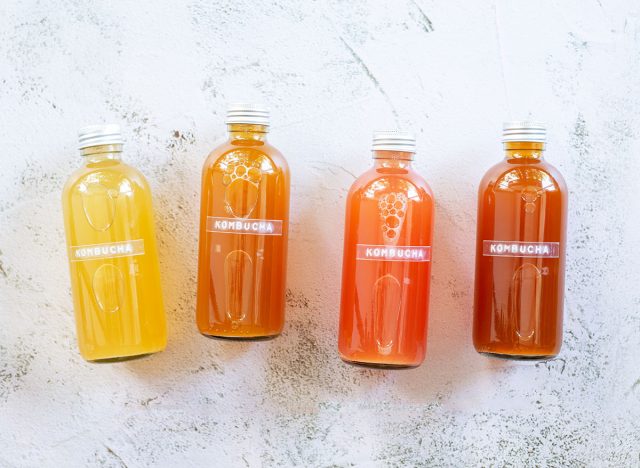The #1 Best Drink for a Healthier Gut, Says Dietitian

Who doesn't want a healthy gut? One that is free of bloating, distension, gassiness, nausea, diarrhea, constipation, and lacking any sort of gastrointestinal health problem. Most of these issues could be ordinary intermittent stomach upset or a result of stress or anxiety that causes our tummy to do flip-flops, but also could signal an issue for other underlying concerns. It's best to talk to your doctor if these symptoms are persistent, but if you are looking for a great drink choice that can help improve the environment of your gut, look no further than the natural foods industry's most recent beverage obsession: kombucha.
Kombucha is a fermented beverage made from black or green tea, sugar, and a symbiotic culture of bacteria and yeasts (or "SCOBY"). The journal Antioxidants explains that kombucha is made through a five-step process: tea infusion (brewing for 5-30 minutes), removal of tea leaves and filtration, the addition of sugar, SCOBY (which includes acetic acid bacteria or lactic acid bacteria), and fermentation for 6 to 14 days.
In fact, despite kombuchas not being carbonated, that fermentation naturally makes the product bubbly, so don't move it around too much before you open the cap, or you may have a mess to clean up (and wasted product)! Keep in mind that the fermentation of yeast may result in a small amount of alcohol (up to about 0.5%) in the product.

Although kombucha contains live cultures, not all types of kombucha use microorganisms classified as probiotics. Probiotics are defined as live microorganisms that, when administered in adequate amounts, confer a health benefit to the host. The primary probiotic genera to seek out include Lactobacillus and Bifidobacterium, but also Streptococcus, Saccharomyces, Bacillus, Enterococcus, and Escherichia.
These probiotics are associated with advantages in the prevention or treatment of eczema, inflammatory bowel disease (IBD), irritable bowel syndrome (IBS), certain types of diarrhea, high cholesterol, and even perhaps obesity. Unfortunately, not enough evidence exists to confirm if fermented foods or beverages without probiotics provide significant health benefits.
Look for these things when picking a kombucha:
- Less than 50 calories per 8-ounce serving
- Less than 10 grams of added sugar per 8-ounce serving
- Less than 15 milligrams of caffeine per 8-ounce serving
- Contains actual probiotics (i.e. Lactobacillus, Bifidobacterium, etc.)
- If the type of microorganism is not specified on the label, call the manufacturer!
- Aim for 1 billion "colony-forming units" (CFUs) per serving
Water should always comprise the majority of our fluid intake, but including one kombucha beverage a day toward your hydration goals is a terrific way to help support a healthy gut.
READ MORE: 17 Things You Need to Know About Kombucha








